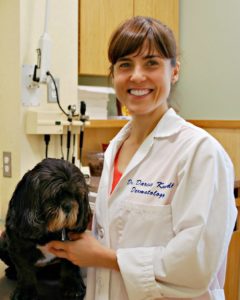Environmental allergies are a life-long problem for so many pets. What is especially hard is that we cannot easily remove environmental allergens. Most dogs and cats are NOT allergic to cleaning products, laundry detergents, or litter. Although many dog and cat parents would be willing to do anything for their pets, cleaning or filtering simply will not remove the allergens that can trigger symptoms. We do not expect you to keep your pet in a bubble! We want cats to be able to bird-watch in the window and we want dogs to run around on the mall!
Most environmental allergies need a multi-pronged approach. We aim to strengthen the skin barrier, prevent infections, relieve the sensation of itchiness, and “retrain” the immune system. Dr. Lindsey Citron (one of our board-certified dermatologists) comments that “Certain treatments may be better suited for your pet at the beginning of the allergy journey but over time your pet may need escalation to a different or more robust therapy. Our best defense in staving off this progression of symptoms and worsening of allergic disease is by using allergen specific immunotherapy.”
Many humans with allergies are likely familiar with this therapy. We use the same allergens that are used for humans! For dogs and cats, we perform intradermal skin testing (IDAT). This is a generally safe diagnostic test where we inject allergens into the skin to measure the patient’s reactions to specific allergens. Examples are ragweed pollen, red cedar tree pollen, and dust mite extract. Serum or blood testing for allergies is also available, but is not always as sensitive as skin testing. Because we inject the allergens into the skin during the testing – the primary organ where allergies manifest – we see a more robust reaction with intradermal testing.
The point of allergy testing is to formulate immunotherapy. This is serum made for the individual patient that is given over time to help make the immune system more tolerant – less reactive – to allergens in the environment. It does take time to work and it does need to be given consistently but is incredibly safe and the only treatment we have that actually works to correct the root cause of the allergies.
There are multiple ways to deliver the serum. It can be given via injection, via oral drops, or even injected directly into the patient’s lymph nodes. There are different factors that might make one treatment better for an individual patient – this can certainly be discussed during an allergy appointment. Both Dr. Darcie Kunder and Dr. Citron love talking about immunotherapy and performing skin testing. We see about 65-75% of patients respond to this therapy with time and consistent delivery. Because this therapy works to “retrain” the immune system we try to start it as early as possible. Testing a patient that is between 1-3 years of age is amazing!
It is true that this is a long-term approach – it can take 12-18 months to see a patient fully respond and we recommend continuing it for 2-3 years (or longer) depending on the response of the patient. Dr. Citron and Dr. Kunder are happy to work with individual pet parents to make a plan that works best for the pet patient. If you would like more information or guidance on allergy management and testing please visit us at Friendship Hospital for Animals in the Dermatology and Allergy Service!

Dr. Darcie Kunder is a Diplomate of the American College of Veterinary Dermatology. She graduated from the University of Pittsburgh, where she majored in Poetry Writing. She attended veterinary school at the University of Pennsylvania School of Veterinary Medicine before completing a 1-year Small Animal internship in Connecticut and a 1-year Specialty internship in Dermatology at the University of Wisconsin Veterinary Medical Teaching Hospital, followed by a 3-year dermatology residency program at the University of Pennsylvania School of Veterinary Medicine.
